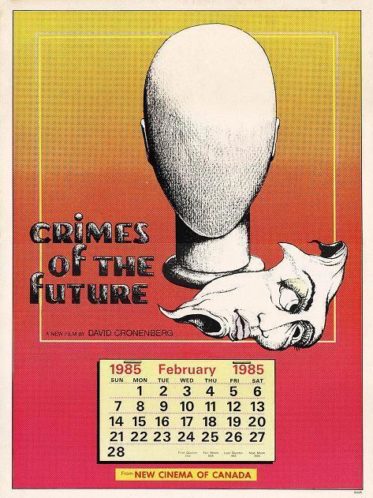 An hour long mini-feature that’s required viewing for any David Cronenberg completest. Made in 1970, CRIMES OF THE FUTURE was one of Cronenberg’s first attempts at filmmaking, being the final and most ambitious of a short film quartet that commenced with TRANSFER, FROM THE DRAIN and STEREO. It also marked the genesis of much of his subsequent oeuvre; aspects of SHIVERS, RABID, THE BROOD, SCANNERS, DEAD RINGERS and CRASH are all contained in CRIMES OF THE FUTURE, a title that, appropriately, also adorns Cronenberg’s latest and probably final feature (which for the record is not a straight remake of the earlier film).
An hour long mini-feature that’s required viewing for any David Cronenberg completest. Made in 1970, CRIMES OF THE FUTURE was one of Cronenberg’s first attempts at filmmaking, being the final and most ambitious of a short film quartet that commenced with TRANSFER, FROM THE DRAIN and STEREO. It also marked the genesis of much of his subsequent oeuvre; aspects of SHIVERS, RABID, THE BROOD, SCANNERS, DEAD RINGERS and CRASH are all contained in CRIMES OF THE FUTURE, a title that, appropriately, also adorns Cronenberg’s latest and probably final feature (which for the record is not a straight remake of the earlier film).
A $20,000 budgeted project filmed in various Ontario locations, CRIMES OF THE FUTURE was lensed entirely without sound. The soundtrack is comprised of various ambient effects (repetitive bird cawing and running water are especially prevalent) and studiedly unemotional narration, which go well with the only-partially-coherent narrative. The film is the near-quintessence of early 1970s underground cinema, which tended to favor asynchronous sound and eccentric non-narratives; for like-minded examples check out the underground sci fi features GLEN AND RANDA and THE BIG MESS (both 1971), and THE GRANDMOTHER (1970), an early effort by the other David (Lynch, that is).
Trailer: CRIMES OF THE FUTURE (May 2017 Brunch) from Nitehawk Cinema on Vimeo.
Taking place in the far off year 1997, CRIMES OF THE FUTURE begins in an ultra-sterile big city enclosure known as the House of Skin. This outfit, the narrator informs us, began as a cosmetic research lab, but then the mad gynecologist Anton Rouge seized control and shifted the institute’s focus to the study of venereal diseases. He now presides over a very hippie-ish male cast who are taking on female characteristics.
Much of the world’s female population, it seems, has been decimated by a disease known as “Rouge’s Malady.” This contagion causes the sufferer’s ears to discharge a white secretion—“Rouge’s Foam”—that Rouge himself finds quite appetizing, and the mouth to gush a chocolaty fluid. There’s also a doctor who catches venereal diseases from his patients, resulting in strange lifeforms growing on his body. Inevitably the house falls into decline as its overseers are increasingly overcome by competitiveness and infighting, with Rouge himself disappearing after contracting the disease that bears his name.
From there the focus shifts to the House of Skin’s director Adrien Tripod. He joins a group of pedophile creeps who set up psychic spheres in preparation, somehow, for the creation of a new sexuality, leading to Tripod inciting a violent rebellion. Tripod then goes into exile with some equally deranged colleagues and a little girl, who Tripod and co. become determined to impregnate(!).
What this film has in its favor is an authentically futuristic atmosphere. Cold and clinical to a downright otherworldly degree, and visualized through impeccably orderly, symmetrical compositions, it has the feel of a dispatch from some future age (the late sixties fashions and hairstyles aside). Plus, in a departure from most underground films then and now, it was shot on 35mm film, giving it a sleek and professional look.
Unfortunately the non-budget didn’t allow for any real special effects, resulting in a number of mutations and creatures that are spoken of by the narrator but never seen. A similar complaint I have is with the young Cronenberg’s storytelling skills, which were not particularly well developed (although in fairness, he doesn’t appear to have cared much about writing prowess). The death of the main character midway through the film is left un-shown (with only a disinterested description by the narrator alerting us to the event), and a plethora of interesting biologically-oriented, body-centered (read: Cronenbergian) ideas are aired that go frustratingly undeveloped. At least we have Cronenberg’s subsequent films, allowing us to see those conceptions reach their full mind-roasting potential.
Vital Statistics
CRIMES OF THE FUTURE
Emergent Films
Director/Producer/Screenplay/Cinematography/Editing: David Cronenberg
Cast: Ronald Moldzik, Jon Lidolt, Tania Zolty, Paul Mulholland, Jack Messinger, Iain Ewing, William Haslam, Ray Woodley, Stefan Czernecki, Rafe Macpherson, Willem Poolman, Don Owen, Udo Kasemets, Bruce Martin, Brian Linehan, Leland Richard, Stephen Zeifman, Norman Snider, William Wine, Kaspers Dzeguze, Sheldon Cohen, George Gibbins
